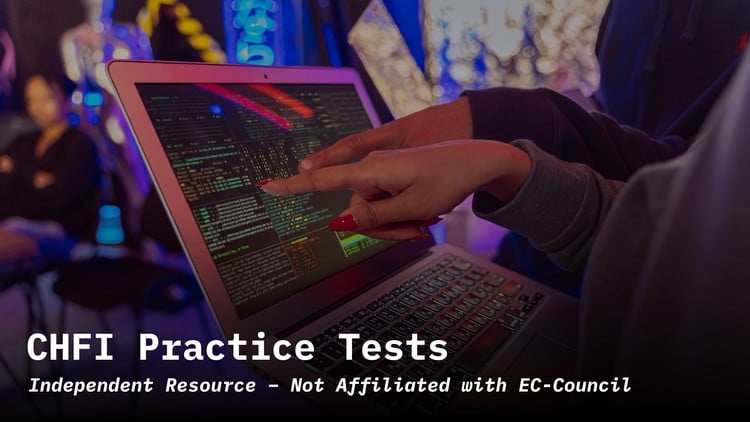
Learn digital forensics, evidence handling, and investigation skills to prepare for the exam.
👥 2,285 students
🔄 September 2025 update
Add-On Information:
Note➛ Make sure your 𝐔𝐝𝐞𝐦𝐲 cart has only this course you're going to enroll it now, Remove all other courses from the 𝐔𝐝𝐞𝐦𝐲 cart before Enrolling!
- Course Overview
- This comprehensive collection of independent practice exams is meticulously designed for aspiring and practicing cybersecurity professionals specializing in computer hacking forensics. It serves as an invaluable self-assessment tool, allowing learners to rigorously test their knowledge and application of digital forensic methodologies against scenarios commonly encountered in industry certification exams and real-world investigations. The course emphasizes a practical, exam-oriented approach, moving beyond theoretical concepts to challenge your ability to identify, acquire, preserve, analyze, and present digital evidence in a legally sound and technically proficient manner. With a focus on simulated hacking scenarios, you will confront challenges involving intrusion detection, malware analysis, data recovery from compromised systems, and incident response procedures. This independent study format empowers you to progress at your own pace, providing the flexibility needed to integrate exam preparation seamlessly into your professional life. Engage with diverse question types, including multiple-choice, true/false, and scenario-based questions, all aimed at sharpening your critical thinking and problem-solving skills essential for excelling in the highly demanding field of digital forensics.
- Requirements / Prerequisites
- A fundamental understanding of computer networking principles, including TCP/IP, common network protocols, and basic network topologies, is highly recommended to grasp the context of network-based forensic investigations.
- Familiarity with various operating systems, particularly Windows and Linux environments, including command-line interfaces, file systems (e.g., NTFS, ext4), and user management, will be beneficial for analyzing system artifacts.
- Basic knowledge of information security concepts such as common attack vectors (e.g., phishing, malware, brute force), defensive mechanisms, and security best practices will provide a solid foundation.
- Prior exposure to programming or scripting languages (e.g., Python, Bash) is not strictly required but can aid in understanding automation in forensic tools and interpreting scripts often found in malicious payloads.
- Access to a personal computer with internet connectivity is essential for accessing the practice exam platform. While no specific software installations are mandated for the exams themselves, a virtual lab environment for hands-on practice outside the exams is highly encouraged for practical skill development.
- A strong commitment to independent study and self-discipline is crucial, as this course is designed for self-paced learning without direct instructor intervention.
- Skills Covered / Tools Used (Conceptual)
- Digital Evidence Identification and Acquisition: Develop proficiency in recognizing potential sources of digital evidence across various devices and platforms, and understand the principles of forensically sound data acquisition methods to ensure integrity.
- Data Preservation and Chain of Custody: Master the critical processes of preserving digital evidence to prevent alteration or destruction, alongside maintaining an unbroken chain of custody documentation crucial for legal admissibility.
- Filesystem Forensics: Gain expertise in analyzing common file systems (e.g., FAT, NTFS, HFS+, ext4) to uncover deleted files, hidden partitions, metadata, and other forensic artifacts indicative of user activity or malicious intent.
- Network Forensics: Hone skills in capturing and analyzing network traffic (packet analysis) to identify intrusion attempts, data exfiltration, command and control communications, and other network-based indicators of compromise.
- Memory Forensics: Understand techniques for capturing and analyzing volatile memory (RAM) dumps to extract running processes, open network connections, loaded modules, and cryptographic keys that might not be present on persistent storage.
- Malware Analysis Fundamentals: Learn to identify characteristics of various malware types, understand their persistence mechanisms, and interpret static/dynamic analysis reports to determine their impact and functionality.
- Reporting and Expert Witness Testimony Preparation: Practice articulating technical findings clearly, concisely, and impartially in written reports, and conceptually prepare for the presentation of evidence in a legal context.
- Incident Response Methodologies: Internalize the phases of incident response (preparation, identification, containment, eradication, recovery, lessons learned) as a framework for managing security breaches effectively.
- Conceptual Understanding of Tools: While not directly using tools within the exam environment, the practice questions will test your knowledge of how industry-standard forensic tools such as Autopsy, FTK Imager, Wireshark, Volatility, SIFT Workstation, and various command-line utilities are applied in different forensic scenarios.
- Benefits / Outcomes
- Exam Confidence Boost: Significantly enhance your readiness and confidence for professional certification exams in computer hacking forensics by rigorously testing your knowledge against a broad spectrum of relevant topics.
- Knowledge Gap Identification: Pinpoint specific areas of strength and weakness in your understanding of digital forensics and incident response, allowing for targeted study and improvement.
- Practical Scenario Application: Develop the ability to apply theoretical forensic concepts to practical, simulated hacking and incident response scenarios, improving your problem-solving capabilities under pressure.
- Enhanced Critical Thinking: Improve your analytical and critical thinking skills by dissecting complex forensic problems and evaluating multiple potential solutions, mirroring real-world investigative challenges.
- Career Advancement: Strengthen your foundational and advanced understanding of digital forensics, which is crucial for roles such as Forensic Analyst, Incident Responder, Cyber Security Investigator, and Security Engineer.
- Independent Learning Mastery: Cultivate self-discipline and effective independent study habits, a valuable skill set for continuous professional development in the rapidly evolving cybersecurity landscape.
- Validation of Skills: Gain an objective measure of your current proficiency in key forensic domains, providing a benchmark for your professional growth and expertise.
- PROS
- Provides an excellent self-assessment platform to gauge exam readiness.
- Covers a wide range of topics pertinent to computer hacking forensics certifications.
- Offers a flexible, self-paced learning structure ideal for busy professionals.
- Helps identify specific knowledge gaps for focused study.
- Enhances practical application of forensic principles through scenario-based questions.
- Reinforces critical thinking and problem-solving skills vital for the field.
- CONS
- As an independent practice exam course, it lacks direct instructor interaction and personalized feedback.
Learning Tracks: English,IT & Software,IT Certifications
Found It Free? Share It Fast!